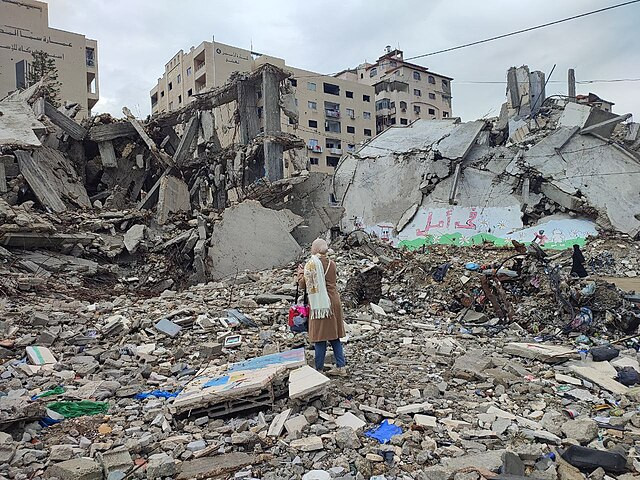At least 12 Palestinians were killed by Gaza's Hamas-run police in the early hours of Thursday, amid escalating clashes over Israel-backed aid operations in the besieged territory. The Gaza Humanitarian Foundation (GHF), a U.S.- and Israeli-supported aid group, said a bus carrying its local Palestinian workers was attacked by Hamas the night before, resulting in the deaths of at least eight staff members and the possible abduction of others.
The Hamas-affiliated Sahm unit claimed responsibility for the killings, describing the victims as members of an Israeli-backed militia led by Yasser Abu Shabab. Video released by the unit appeared to show several dead men on the street. The footage could not be independently verified.
According to Sahm, the killings targeted collaborators who had worked with Israeli forces in southern Gaza. The group did not provide further evidence, and the identities of the dead remain unconfirmed. The Israeli military shared the GHF's statement but offered no official account of the incident.
The GHF said in a statement, "We condemn this heinous and deliberate attack in the strongest possible terms. These were aid workers. Humanitarians. Fathers, brothers, sons, and friends, who were risking their lives everyday to help others."
Rev. Johnnie Moore, an evangelical advisor to U.S. President Donald Trump and newly appointed head of the GHF, responded online: "These dear people were murdered by Hamas because they just wanted to feed their people. They were not militants. They were humanitarians, many of them young people." He added, "The principle of impartiality does not mean neutrality. There is good and evil in this world. What we are doing is good and what Hamas did to these Gazans is absolute evil."
Clashes between Hamas and Abu Shabab's militia have intensified in recent days. Ghassan Duhine, who identifies as a major in the Palestinian Authority's security forces and a deputy commander of the Abu Shabab group, posted online that they had clashed with Sahm forces and killed five. He denied that images circulating of the executed men were members of his group. The Palestinian Authority has denied any connection to Abu Shabab, though many of the militia's fighters claim PA affiliations.
Separately, Israeli military action near food distribution points led to further bloodshed. On Wednesday, at least 60 Palestinians were killed in Gaza, with nearly two-thirds reportedly seeking food from GHF-run sites, according to local health authorities. Palestinian civil defense officials said another 22 were killed Thursday morning, 16 of them waiting for aid.
- Casualty Breakdown:
- Wednesday: 60 Palestinians killed (local health authorities)
- Thursday: 22 additional dead, including 16 near food points (civil defense)
- Netzarim checkpoint: 10 dead, 200 wounded from drone strikes (al-Awda Hospital)
A civil defense official, Mohammed al-Mughayyir, told Agence France-Presse that bombs dropped by Israeli drones struck civilians gathering for aid near the Netzarim checkpoint in central Gaza.
Internet and telecommunications were also knocked out across Gaza. Telecom provider Paltel said a key line was severed during an Israeli operation, and the military refused access for technicians. The Israeli military said it was investigating the outage.
The GHF has conducted its operations under a cloud of controversy since launching last month. The group's coordination with Israeli military zones has drawn accusations of militarizing humanitarian relief. Witnesses previously alleged that Abu Shabab's militia had opened fire on civilians heading to GHF distribution hubs. GHF denies any affiliation with the militia.
The United Nations and global aid organizations have rejected the GHF's model. Philippe Lazzarini, head of the UN Relief and Works Agency (Unrwa), stated: "The so-called new way of handling assistance in Gaza is most degrading, humiliating and puts lives in danger." He added, "The dystopian 'Hunger Games' cannot become the new reality. The UN including Unrwa have the knowledge, expertise & community trust to provide dignified and safe assistance. Just let the humanitarians do their jobs."
Israel has banned Unrwa from operating in Gaza, citing allegations of complicity with Hamas. Although nine employees were dismissed after an internal review, no evidence was found to support broader Israeli claims. Israel severed ties with Unrwa in January, a decision backed by the Trump administration.
Amid the crisis, Israel has begun allowing limited aid from the UN World Food Programme. On Wednesday, 56 WFP trucks entered Gaza through the Zikim crossing. The WFP said, "Since the limited resumption of humanitarian assistance into Gaza on 19 May, WFP has been able to bring only small amounts of food into Gaza. This is largely due to delays or denials of permission for humanitarian movements due to expanded military operations."
The WFP reported that fewer than 7,000 metric tonnes of food had entered Gaza as of June 11. With Israel barring Unrwa from distributing aid, and ongoing looting disrupting efforts, the WFP has been dropping off supplies directly in populated areas, leaving residents to unload them.






